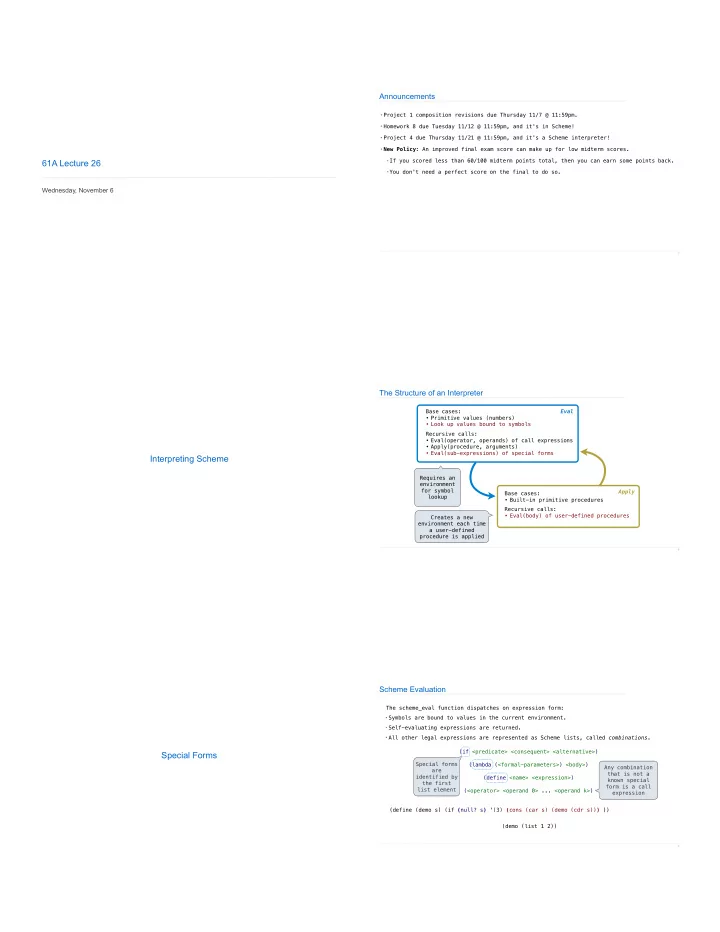

Announcements • Project 1 composition revisions due Thursday 11/7 @ 11:59pm. • Homework 8 due Tuesday 11/12 @ 11:59pm, and it's in Scheme! • Project 4 due Thursday 11/21 @ 11:59pm, and it's a Scheme interpreter! • New Policy : An improved final exam score can make up for low midterm scores. If you scored less than 60/100 midterm points total, then you can earn some points back. 61A Lecture 26 You don't need a perfect score on the final to do so. Wednesday, November 6 2 The Structure of an Interpreter Base cases: Eval • Primitive values (numbers) • Look up values bound to symbols Recursive calls: • Eval(operator, operands) of call expressions • Apply(procedure, arguments) • Eval(sub-expressions) of special forms Interpreting Scheme Requires an environment for symbol Apply Base cases: lookup • Built-in primitive procedures Recursive calls: • Eval(body) of user-defined procedures Creates a new environment each time a user-defined procedure is applied 4 Scheme Evaluation The scheme_eval function dispatches on expression form: • Symbols are bound to values in the current environment. • Self-evaluating expressions are returned. • All other legal expressions are represented as Scheme lists, called combinations . (if <predicate> <consequent> <alternative>) Special Forms Special forms (lambda (<formal-parameters>) <body>) Any combination are that is not a identified by (define <name> <expression>) known special the first form is a call list element (<operator> <operand 0> ... <operand k>) expression (define (demo s) (if ( null? s ) '(3) ( cons (car s) (demo (cdr s)) ) )) (demo (list 1 2)) 6
Logical Special Forms Logical forms may only evaluate some sub-expressions. • If expression: (if <predicate> <consequent> <alternative>) • And and or : (and <e 1 > ... <e n >), (or <e 1 > ... <e n >) • Cond expr'n: (cond (<p 1 > <e 1 >) ... (<p n > <e n >) (else <e>)) Logical Forms The value of an if expression is the value of a sub-expression. do_if_form • Evaluate the predicate. • Choose a sub-expression: <consequent> or <alternative>. • Evaluate that sub-expression in place of the whole expression. scheme_eval (Demo) 8 Quotation The quote special form evaluates to the quoted expression, which is not evaluated. evaluates to the (quote <expression>) (quote (+ 1 2)) (+ 1 2) three-element Scheme list The <expression> itself is the value of the whole quote expression. Quotation '<expression> is shorthand for (quote <expression>). (quote (1 2)) '(1 2) is equivalent to The scheme_read parser converts shorthand to a combination. (Demo) 10 Lambda Expressions Lambda expressions evaluate to user-defined procedures. (lambda (<formal-parameters>) <body>) (lambda (x) (* x x)) Lambda Expressions class LambdaProcedure: def __init__(self, formals, body, env): self.formals = formals A scheme list of symbols self.body = body A scheme expression self.env = env A Frame instance 12
Frames and Environments A frame represents an environment by having a parent frame. Frames are Python instances with methods lookup and define . In Project 4, Frames do not hold return values. Define Expressions g: Global frame y 3 z 5 f1: [parent=g] x 2 z 4 (Demo) 13 Define Expressions Applying User-Defined Procedures Define binds a symbol to a value in the first frame of the current environment. To apply a user-defined procedure, create a new frame in which formal parameters are bound to argument values, whose parent is the env of the procedure. (define <name> <expression>) Evaluate the body of the procedure in the environment that starts with this new frame. 1. Evaluate the <expression>. (define (demo s) (if ( null? s ) '(3) ( cons (car s) (demo (cdr s)) ) )) 2. Bind <name> to its value in the current frame. (demo (list 1 2)) (define x (+ 1 2)) g: Global frame LambdaProcedure instance [parent=g] demo Pair Pair Procedure definition is shorthand of define with a lambda expression. [parent=g] s 1 2 nil (define (<name> <formal parameters>) <body>) [parent=g] s (define <name> (lambda (<formal parameters>) <body>)) [parent=g] s 15 16 Eval/Apply in Lisp 1.5 Dynamic Scope 17
Dynamic Scope The way in which names are looked up in Scheme and Python is called lexical scope (or static scope ). Lexical scope: The parent of a frame is the environment in which a procedure was defined . Dynamic scope: The parent of a frame is the environment in which a procedure was called . Special form to create dynamically scoped procedures mu (define f (lambda (x) (+ x y))) (define g (lambda (x y) (f (+ x x)))) (g 3 7) Lexical scope: The parent for f's frame is the global frame. Error: unknown identifier: y Dynamic scope: The parent for f's frame is g's frame. 13 19
Recommend
More recommend